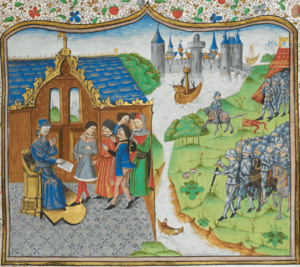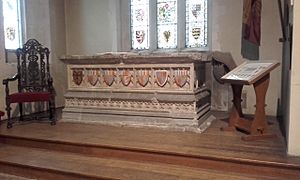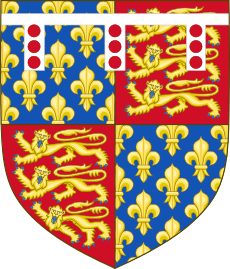Edmund of Langley, 1st Duke of York facts for kids
Quick facts for kids Edmund of Langley |
|
|---|---|
| Duke of York | |

Edmund of Langley before King Ferdinand I of Portugal, from Jean de Wavrin's Chronique d'Angleterre
|
|
| Born | 5 June 1341 Kings Langley, Hertfordshire, England |
| Died | 1 August 1402 (aged 61) Kings Langley, Hertfordshire, England |
| Burial | Kings Langley, Hertfordshire |
| Spouse | Isabella of Castile Joan Holland |
| Issue | Edward, 2nd Duke of York Constance, Countess of Gloucester Richard, 3rd Earl of Cambridge |
| House | Plantagenet (by birth) York (founder) |
| Father | Edward III, King of England |
| Mother | Philippa of Hainault |
Edmund of Langley, Duke of York (born 5 June 1341 – died 1 August 1402) was an important English prince. He was the fourth son of King Edward III of England and Queen Philippa of Hainault. Edmund got his nickname "of Langley" because he was born at Kings Langley Palace in Hertfordshire.
He was the person who started the House of York. This family later made a claim to the English throne during the Wars of the Roses. This happened through his younger son, Richard of Conisburgh, 3rd Earl of Cambridge. The other main family in the Wars of the Roses was the House of Lancaster. They were descendants of Edmund's older brother, John of Gaunt, 1st Duke of Lancaster.
Contents
Early Life and Titles
When Edmund's godfather, the Earl of Surrey, passed away, Edmund received some of his lands in Yorkshire. In 1359, he joined his father, King Edward III, on a military trip to France. This trip was not successful.
In 1361, Edmund became a Knight of the Garter. This was a very special honor. The next year, in 1362, when he was 21 years old, his father made him the Earl of Cambridge.
Military Adventures
Edmund took part in several military trips to France in the 1370s. In 1369, he led 400 soldiers and 400 archers to fight in Brittany and Angoulême. The next year, he joined his oldest brother, Edward, the Black Prince, in a campaign that ended with the attack on Limoges. In 1375, he sailed to help the town of Brest. After some success, a peace agreement was made.
In the 1370s, England made a deal with Ferdinand I of Portugal. Portugal promised to attack Castile with the English army. In 1381, Edmund led an expedition to Castile. He joined King Ferdinand in attacking Castile as part of the Fernandine Wars. However, after many months, peace was declared between Castile and Portugal. Edmund had to lead his unhappy soldiers back home.
Edmund was given important jobs, like being in charge of Dover Castle and the Cinque Ports from 1376 to 1381. On 6 August 1385, he was given the higher title of Duke of York.
He also served as "Keeper of the Realm" (meaning he ruled England in the King's absence) several times. He did this in 1394-1395 when his nephew, King Richard II of England, was fighting in Ireland. He also led Parliament in 1395. Edmund was again Keeper of the Realm in 1396 when the King went to France. In 1399, when King Richard II went to Ireland again, Edmund was left in charge.
Later that year, Henry Bolingbroke returned to England from exile. Edmund first tried to stop Bolingbroke, but then decided to join him. He was rewarded for this and stayed loyal to the new King Henry IV, who took the throne from Richard II.
Later Years
Towards the end of his life, in 1399, Edmund was in charge of the western borderlands for a short time. After that, he mostly retired from public life.

Edmund of Langley passed away in his birthplace on 1 August 1402. He was first buried at King's Langley Priory. However, his tomb was moved to the nearby All Saints' Church, Kings Langley in 1575. This happened after the priory was closed down. When his tomb was moved again in 1877 during church repairs, three bodies were found inside: one male and two female.
His title of Duke of York went to his oldest son, Edward. Edmund was the last of his brothers and sisters to die, and he lived the longest of all of them.
Family Life
Edmund's first wife was Isabella. She was the daughter of King Peter of Castile. Isabella was also the sister of Constance of Castile, who was the second wife of Edmund's brother, John of Gaunt. Both Edmund and Isabella were related to Henry II of England.
Edmund and Isabella had two sons and one daughter:
- Edward of Norwich, 2nd Duke of York (born around 1373 – died 25 October 1415). He was killed in battle at Battle of Agincourt.
- Constance of York (born around 1374 – died 28 November 1416). She was the great-grandmother of Queen Anne Neville.
- Richard of Conisburgh, 3rd Earl of Cambridge (born around 20 July 1385 – died 5 August 1415). He was executed for treason. Richard was an ancestor of kings Edward IV, Edward V, and Richard III from the House of York. He is also an ancestor of all English monarchs after King Henry VIII.
After Isabella died in 1392, Edmund married his second cousin, Joan Holland. They did not have any children together.
Edmund in Shakespeare's Play
Edmund, the 1st Duke of York, is a main character in Shakespeare's play Richard II. In the play, Edmund stops being an adviser to his nephew, King Richard II. He doesn't want to betray the King. But he eventually agrees to help Henry Bolingbroke get back his lands. After Bolingbroke takes the throne and becomes King Henry IV, Edmund finds out that his son, Aumerle (Edward of Norwich), plans to kill the new king. Edmund tells King Henry IV about the plot. However, his wife Isabella convinces the King to forgive their son.
See also
In Spanish: Edmundo de Langley para niños
 | Selma Burke |
 | Pauline Powell Burns |
 | Frederick J. Brown |
 | Robert Blackburn |


